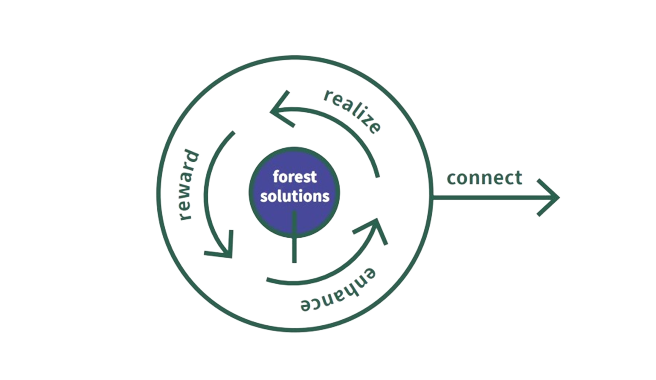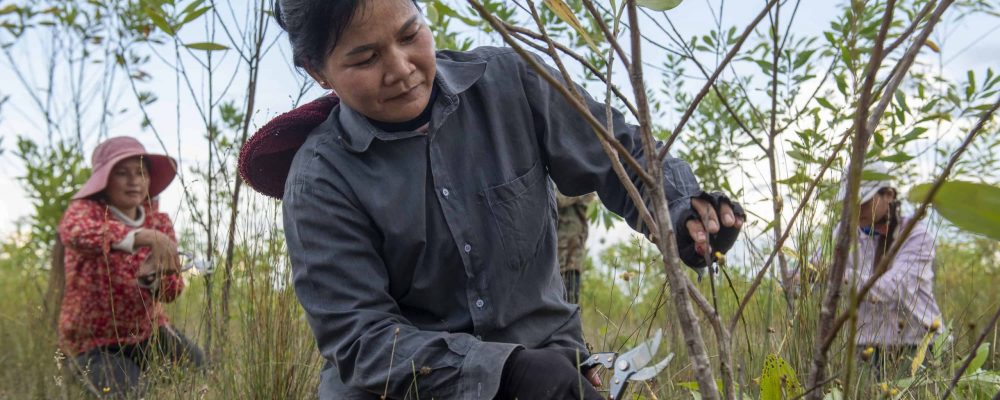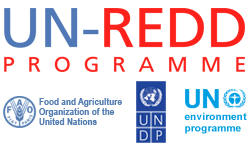
The UN-REDD Programme is pleased to present its 2022 Annual Report, showcasing the remarkable progress made in its mission to support developing countries in their efforts to reduce emissions from deforestation and forest degradation and to promote sustainable forest management. The report provides an overview of the Programme’s activities and results achieved in 2022, highlighting its contributions to climate action, biodiversity conservation and sustainable development.
UN-REDD continues to help countries fully realize the mitigation potential of forest solutions to the climate emergency by avoiding carbon emissions and fostering carbon sequestration at levels of at least 5 GtCO2e per year by 2030. Within the scope of this ambition, the UN-REDD results framework for the period 2021-2025 was adopted, aiming to support countries in implementing and enhancing forest solutions to the climate emergency. UN-REDD has sharpened its focus to assist countries in accessing performance-based finance schemes for REDD+ results, including carbon markets (under Article 6 of the Paris Agreement) by supporting them to meet standards of high environmental integrity and to further advance their efforts to deliver results. The results framework aligns UN-REDD with the major international development undertakings in the coming decade as the Paris Agreement enters full implementation and the Sustainable Development Goals (SDGs) are realized.
In 2022, the world faced a critical juncture in the fight against climate change and biodiversity loss. The Intergovernmental Panel on Climate Change (IPCC) released its Sixth Assessment Report, with a warning that global warming is accelerating, and the effects are already irreversible. The 2022 UNEP Emissions Gap Report revealed that the world is on track for a temperature rise of over 2.7 degrees above pre-industrial levels by the end of the century, well above the Paris Agreement target of limiting warming to 1.5 degrees. The 2022 UN Biodiversity Conference adopted the Global Biodiversity Framework, which sets ambitious targets for the protection and restoration of biodiversity, including forests, by 2030. The fifth session of the United Nations Environment Assembly (UNEA) delivered a universal definition of Nature-based Solutions. Momentum for forests continued at the World Forestry Congress in Korea, with the European Union’s regulation on deforestation-free trade, and finally to the UNFCCC COP27 where governments came together to accelerate action towards achieving the goals of the Paris Agreement and UN-REDD’s Making Good on the Glasgow Climate Pact paper was launched.
Against this backdrop, the UN-REDD Programme has continued to play a leading role in ramping up action for forests and nature. The Programme made significant strides in strengthening the technical capacities of partner countries to implement REDD+ activities, mobilizing financial resources for REDD+ initiatives and promoting stakeholder engagement and participation in REDD+ activities.
The Programme continued to expand its impact by working with a growing number of partner countries. UN-REDD has 65 partner countries, including 23 in Africa, 20 in Asia-Pacific, and 22 in Latin America and the Caribbean, providing direct technical assistance and capacity building to 25 countries to helping them to develop and implement national REDD+ strategies and action plans. The Programme also launched several initiatives aimed at promoting the adoption of sustainable land-use practices and reducing emissions from the agriculture and land-use sectors by working closely with partner countries to strengthen their capacities to access and mobilize climate finance, including through the Green Climate Fund and other multilateral funds.
UN-REDD assists partner countries in their efforts to complete the four pillars of the Warsaw Framework for REDD+, a requirement for results-based finance. Adopted in 2013, the Warsaw Framework outlines four areas of REDD+ readiness: national REDD+ strategies or action plans (NS/AP), national forest monitoring systems (NFMS), forest reference emissions levels/forest reference levels (FREL/FRL), and Safeguards Information Systems (SIS).
Highlights of support to countries are presented below for each of the four outcomes of the UN-REDD 2021-2025 Results Framework.

UN-REDD continued to provide technical support to countries to advance the implementation of policies in line with REDD+ strategies, define nesting approaches, develop financing strategies, enhance cost-effectiveness, establish or improve SIS, support social inclusion and multicultural dialogues, decouple agricultural and forestry supply chains from deforestation, enhance monitoring systems, and update and enhance forest reference levels. The Programme also continued to support countries with analysis of available data so they could make an informed decision on whether to submit a proposal to the Lowering Emissions by Accelerating Forest Finance (LEAF) Coalition, as well as with initial ART-TREES gap assessments and support to populate the capacity building and technical assistance needs in their LEAF proposals.
UN-REDD has made progress towards mobilizing $5 billion of results-based financing (RBF) for REDD+ in 10 countries, including Colombia, Costa Rica, DRC, Ecuador, Ghana, Peru, PNG, RoC, Uganda, and Viet Nam. Technical support was provided to these countries for ART-TREES registration documents, which allowed them to access RBF from the LEAF Coalition. Costa Rica and Ecuador have signed memoranda of agreement (MOA) with the LEAF Coalition and are advancing towards signing emissions reductions purchase agreements (ERPAs) with UN-REDD’s technical assistance. DRC, PNG, and Uganda have also signed MOUs with the LEAF Coalition. The potential REDD+ RBF for UN-REDD countries looking to benefit from the LEAF Coalition is estimated to be $1 to 1.2 billion from 2022 to 2026. Additionally, UN-REDD provided technical assistance to Uganda to draft a national results-based finance strategy and continued to support Peru in meeting its Joint Declaration of Intent commitments with Norway, allowing Peru to access $10 million of results-based funding through PROFONANPE. A roadmap to access climate finance from voluntary carbon markets in alignment with the NDC has also been prepared for Peru.
UN-REDD has been supporting countries to integrate and enhance LULUCF sector actions relating to REDD+, to increase the ambition in their new or updated Nationally Determined Contributions (NDCs). Since 2018, UN-REDD has supported more than 25 countries in enhancing the role of forest-related activities into new or updated NDCs, as well as NDC implementation plans. This resulted in several achievements, such as Côte d’Ivoire submitting a revised NDC that mainstreamed forest-based solutions into the NDC’s mitigation measures and increased ambition from 28.25 to 30.41 percent. DRC developed an NDC implementation roadmap and aligned the FONAREDD portfolio to LULUCF targets. Ecuador developed a REDD+ sustainability strategy and a national certification scheme for deforestation-free production and trade. Peru developed a roadmap to access climate finance from voluntary carbon markets (VCM) in alignment with the NDC. Viet Nam submitted an updated NDC that includes raising emissions reductions targets from 9 to 15.8 percent (unconditional) and from 27 to 43.5 percent (conditional) across sectors, including LULUCF. But challenges remain in shifting from pledges to action to facilitate both mitigation and adaptation efforts in the forest sector.
UN-REDD continued work on capturing, managing and disseminating knowledge on how to scale up REDD+ implementation to accelerate climate action. The UN-REDD Executive Board has defined three knowledge management priorities for 2023: REDD+ finance, social inclusion, and the agriculture-forest nexus. A training and dialogue program for Indigenous peoples on climate finance is also being developed for inception during 2023 and implementation in 2023-2024. UN-REDD also focused on global exchanges and trainings in response to partner countries’ requests. To support capacity building on social inclusion in REDD+, UN-REDD convened training sessions and dialogues to connect social equity with REDD+ policy and finance, including a training for Indigenous Peoples on Climate Finance and a training on Climate Finance as a Catalyst for gender equality and women’s empowerment in the forest sector. Collective political and societal support for NbS increased through knowledge-based advocacy events, including the launch of the Making Good on the Glasgow Climate Pact paper at UNFCCC COP27 and UN-REDD participation at the World Forestry Congress.
The Programme continued to support partner countries in integrating gender equality and women’s empowerment principles within REDD+ action. The support provided by UN-REDD ranged from integrating gender within REDD+ benefit sharing systems to ensuring women’s active and equitable involvement in REDD+ efforts. Examples of this include integrating gender and social inclusion at the operational level of the ENCCRV and the +Bosques project in Chile and integrating gender considerations into ART-TREES compliance documentation in Costa Rica. The Republic of the Congo set a minimum threshold of at least 30 percent for women’s participation, which led to an almost 50 percent women’s participation rate in a radar imagery training. In Ecuador, 35 percent of local producers who had their capacities strengthened on commercialization of their deforestation-free products were women. UN-REDD also organized an internal seminar on gender to enhance skills and to increase gender mainstreaming efforts. Moreover, the Programme developed a new tool to measure men’s and women’s participation in workshops, events and trainings, to track the quality and effectiveness of their participation and to assess how often their ideas or proposals are accepted or adopted. Additionally, a new Gender and Forestry Resources Library was created to compile resources related to gender and forestry.
The UN-REDD Programme recognizes the need for greater ambition, collaboration, and innovation in the global effort to address the urgent challenges of climate change, deforestation, and biodiversity loss. Looking ahead, the Programme will ramp up support on REDD+ implementation, the mobilization of finance, and capitalize on the role of forests in achieving net-zero emissions.

